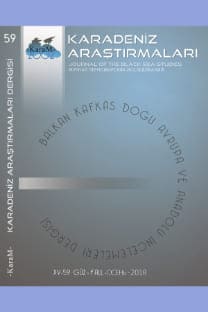Türkiye’nin Karadeniz Vizyonu ve Dinamikleri
Sovyetler Birliği’nin dağılması sonrasında Karadeniz Bölgesi’nin küre- sel gündemde önemi artmıştır. Bölgede tarihi bağlara ve kıyıdaş dev- letler arasında en uzun kıyı şeridine sahip olan Türkiye, 1936 Montrö Boğazlar Sözleşmesi uyarınca Boğazlar’ın kontrolüne sahip olarak bölgesel bir söylem geliştirmiştir. Türkiye, bölgede bölgeselleşme bi- lincini oluşturmak ve tüm kıyıdaş devletler arasında ekonomi, politika ve güvenlik alanlarında işbirliğini geliştirmek için aktif bir politika iz- lemeye başlamış ve bölgede Karadeniz Ekonomik İşbirliği Örgütü (KEİ), Karadeniz Donanma İşbirliği Görev Grubu (BLACKSEAFOR) ve Karadeniz Uyum Harekâtı (KUH) gibi çeşitli oluşumlar başlatarak li- der rol üstlenmiştir. Türkiye’nin bu çabalarının bölgeselleşme bilinci oluşturmasına rağmen, Karadeniz Bölgesi’nin bölgeselleşmesi çeşitli nedenlerden dolayı bu zamana kadar mümkün olmamıştır. Bu neden- ler şu şekilde özetlenebilir: İlk olarak, bu girişimler bölgesel bir anla- yıştan yoksunluğu yansıtmaktadır ve aslında Türkiye’nin de kendine özgü bölgesel bir anlayışı yoktur. Bunun yanısıra, bölgeselleşmenin dinamikleri çeşitli bölgesel, siyasi ve ekonomik kuruluşlara mensup- tur ve her biri iç ve dış ilişkilerinde farklı önceliklere sahiptir. Diğer bir ifadeyle, bölgeselleşme, kıyıdaş devletler tarafından daha çok Batı ile işbirliği olarak görülmüştür. Ayrıca Türkiye, terör tehditleri, Orta Doğu durumu gibi kendi güvenlik meseleleriyle ilgilenmek zorunda- dır. Ve son olarak, Türkiye’nin tarihi rakibi ve bölgede dominant güç olan Rusya, neredeyse tüm bölgesel girişimlerde mevcuttur. Rus- ya’nın varlığı, Karadeniz Bölgesi’nde bölgesel işbirliğini teşvik etmek- ten ziyade, çoğunlukla rekabete neden olmaktadır. Çalışma, bölgesel- leşme kavramının kısa bir tanımlamasıyla başlamaktadır. Çalışmanın ikinci kısmı, bölgede Türk girişimlerine bir arka plan sağlamak adına Karadeniz Bölgesi’nin tarihi sınırlarını çizmektedir. Sonrasında, Tür- kiye’nin girişimleri ve Rusya ile ikili ilişkilerini kapsayan Türkiye’nin Karadeniz vizyonu tartışılmıştır. Çalışma, esasen, bölgeselleşme açı- sından Karadeniz’in eksik yönlerine ve Türkiye’nin bölgesel girişimle- rinin sınırlarına dikkat çekmekte ve ‘’Türkiye’nin Karadeniz vizyonu nedir?’’ ve ‘’bu vizyonu etkileyen dinamikler nelerdir?’’ sorularına ce- vap aramaktadır.
Anahtar Kelimeler:
Bölgeselleşme, Türkiye’nin Karadeniz Vizyonu, KEİ, Karadeniz Donanma İşbirliği Görev Grubu, KUH.
TURKEY’S BLACK SEA VISION AND ITS DYNAMICS
Following the decline of the Soviet Union, the Black Sea Region has increased in significance on the global agenda. Turkey, having historic ties and the longest coastline among littoral states in the region, has developed a regional discourse, as it has control of the Straits in the region in accordance with the Montreux Convention of 1936. It has started to pursue an active policy to create consciousness of regio- nalism in the region and to enhance cooperation among all littoral states in the fields of economy, politics, and security; and it has under- taken a leading role ininitiating various formations in the region, such as Black Sea Economic Cooperation (BSEC), the Black Sea Naval Coo- peration Task Group (BLACKSEAFOR), and the Operation Black Sea Harmony (OBSH). While all these Turkish efforts in relation to the re- gion have created some consciousness of regionalism, it has not been possible to regionalize the Black Sea Region thus far, for various rea- sons. These reasons can be summarized as follows: First of all, Tur- kish initiatives reflect the lack of regional conception, and in fact Tur- key itself does not have a distinctive regional conception. On the other hand, the drivers of regionalism belong to various regional, political, and economic organizations, and they each have different priorities in their internal and external affairs. In other words, regionalism is ma- inly seen by littoral states in terms of cooperation with the West. Furthermore, Turkey has had to deal with its other security issues, such as terrorist threats, the Middle East context, etc. And lastly, Rus- sia, as a historic rival of Turkey and a dominant power in the region, exists in almost all regional initiatives. The existence of Russia mostly leads to rivalry rather than the promotion of regional cooperation in the Black Sea Region. This study begins with a brief definitional dis- cussion of the concept of regionalism. The second part of the study bounds the Black Sea Region with its history to provide the backgro- und to Turkish regionalism in the region. Then, Turkey’s Black Sea vi- sion is discussed, including its initiatives and bilateral relations with Russia. The study mainly points out the shortcomings of the Black Sea with regard to regionalism and the limitations of Turkey’s regional initiatives, and seeks answers to the questions “what is Turkey’s Black Sea vision?” and “which dynamics affect that vision?”
Keywords:
Regionalism, Turkey’s Black Sea Vision, BSEC, BLACKSE- AFOR, OBSH.,
___
- Heywood, A., 2011. Global Politics. London: Palgrave Macmillan.
- Hill, F., and Taşpınar, Ö., 2006. Turkey and Russia: Axis of the Excluded?Survival, 48(1), pp.81-92.
- İrge, N. F., 2017. Karadeniz Havzası Jeopolitiğinde Güç Mücadelesinin Arka Planı ve Bölgesel Güvenliğin Uluslararası Önemi. Marmara University Journal of Political Science, 5, pp.79-92.
- Karadeniz, B., 2007. Security and Stability Architecture in the Black Sea.Perceptions: Journal of International Affairs, Winter, pp.95-117.
- Kiniklioğlu, S., 2006.Turkey’s Black Sea Policy: Strategic Interplay at a Criti- cal Junction. In: R.D. Asmus, ed., Next Steps in Forging a Euroatlantic Strategy for the Wider Black Sea. Washington, DC: The German Mars- hall Fund of the United States, pp.55-64.
- ISSN: 2536-5126
- Yayın Aralığı: Yılda 4 Sayı
- Başlangıç: 2004
- Yayıncı: Osman Karatay
Sayıdaki Diğer Makaleler
“İSTENMEYEN RUMLAR”: ODESSA VE KIRIM’DAN YUNANİSTAN’A GÖÇ HAREKETLERİ, 1919
EVLİYA ÇELEBİ SEYAHATNAMESİ BAĞLAMINDA NAHÇIVAN BÖLGESİ KÜLTÜREL YAŞAMINA BİR BAKIŞ
TİREBOLU-YUKARIBOĞALI’DA KOLÇAK OYUNU: TARİHÇESİ VE SPORA KATKILARI
Çerkez Diasporasının Nitelikleri Üzerine (Rusya’daki Kafkas Çalışmaları Temelinde)
Svetlana I. AKKİEVA, Kasbolat DZAMIKHOV
ÜNİVERSİTE ÖĞRENCİLERİNİN VATANDAŞLIK ALGISI: GÜMÜŞHANE ÜNİVERSİTESİ ÖRNEĞİ
GÜMÜŞHANE İLİ VE YÖRESİ AĞIZLARINDAN DERLEME SÖZLÜĞÜ’NE KATKILAR
ANADOLU’YA YAPILAN İLK SELÇUKLU AKINLARI AÇISINDAN KELKİT VADİSİ’NİN ÖNEMİ
